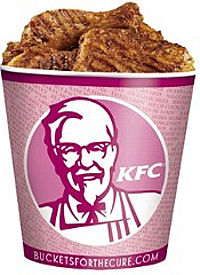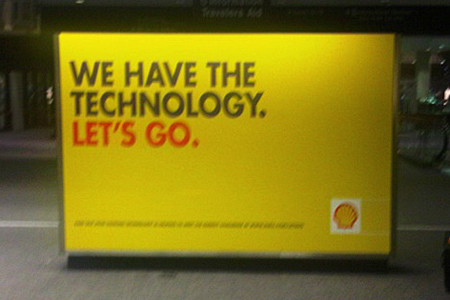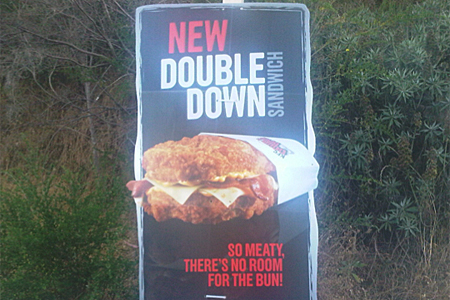|
|
« Previous Business | Next Business » |
|
The Failure of Chevron's New 'We Agree' Ad Campaign
Chevron's
decision to launch a splashy ad campaign with the tagline "We Agree"
was hardly the first time that a global energy company has spent
millions of dollars trying to enhance positive perceptions of their
brand by pivoting away from public opposition. But it may be one
of the last times that we see energy companies trying to saddle up
to members of the public as if they were a potential date at a
Georgetown bar.
Chevron's new campaign was punked by the activist-perfomers The Yes Men, who partnered with the Rainforest Action Network and Amazon Watch to create a fake version of the "We Agree" campaign that was erroneously picked up by the media
as authentic. The Yes Men sent out a fake press release hours
before the launch of the Chevron campaign and created a fake website at www.chevron-weagree.com
that fooled reporters into thinking their campaign was real. Chevron is
currently fighting an $18 billion lawsuit in Ecuador over the actions
of their subsidiary Texaco, dating back twenty years. Chevron claims
that they have repaired the damage caused by the oilfields, and they
contend that the Ecuadorian courts have been biased against them.
According to the Rainforest Action Network, the company is launching this campaign in order to avoid paying one of the largest settlements in history.
Chevron
has launched a campaign that has struck a hollow chord with the public
before. Their "People Do" campaign asked rhetorical questions
about their good works including restoring marshes once used for oil
exploration. Many of those "good deeds" were required by
law.
The Yes Men are tapping into a rich
tradition of political theater that lies somewhere in between Guy Debord
of the French situationist movement and Ashton Kutcher. As the
power of social media continues to grow, we'll see more and more of this
type of takedown. There are no shortage of ad campaigns that
deserve to be mocked.
I saw this campaign from Shell in the San Francisco airport during the heart of the Gulf Oil disaster.
If they really had the technology, it would have been nice if they had gone and shut down the exploding well in the Gulf. But I suppose that wasn't the technology they were talking about.
 Or how about this campaign from Kentucky Fried Chicken for the Susan G. Komen Breast Cancer Foundation?
Or how about this campaign from Kentucky Fried Chicken for the Susan G. Komen Breast Cancer Foundation?KFC committed to donating fifty cents for every bucket of chicken they sold to the Foundation. At about the same time they launched and promoted their 'Double-Down' sandwich which consists of two deep-fried filets of chicken surrounding two pieces of bacon, two pieces of monterey jack cheese, and the Colonel's sauce. It's hard to sell a sandwich with 32 grams of fat and be a respected voice in the fight against breast cancer.
As time goes on, these sorts of campaigns will begin to diminish. Chevron's recent campaigns will be remembered as oddities that were born out of a time when weak research suggested that the public could be tricked in a lasting way by a catchy ad, relentlessly applied. The era of greenwashing is over for the simple reason that it doesn't work. For the price of a URL and a little wit, a campaign that is out of step with reality can be hacked and become more of a liability than a potential benefit.
There will still be companies with reputational liabilities that will push their eager creatives to design campaigns to shine up their names. For them, I offer the following advice.
1) Resolve your crisis.
Before
GE could launch their Ecomagination effort, which brought together
their various ecologically-oriented businesses into one united
initiative, they had to deal with their ongoing Hudson River pollution
liability. Between 1947 and 1977 GE dumped 1.3 pounds of PCBs into
the Hudson River. Environmental advocates and the EPA demanded
that they dredge the river. GE passionately believed they had
fulfilled their moral and legal responsibility to clean the abandoned
site and litigated to protect themselves. Eventually they
concluded that paying the price to clean the Hudson was less expensive
than the continuing attacks on their reputation. There is no role
for a mass communications effort while the public doesn't trust your
desire to resolve your responsibilities.
2) Listen.
CEOs
need to be reminded to be humble in their declarations of social
leadership. The idea of a multi-billion dollar company being
"green" is almost ridiculous, since the phrase has no agreed-upon
meaning and there is always something more you can do. That's one
reason that "sustainability" has gained favor as a goalset for corporate
leaders. To be sustainable means that you bring social,
environmental, economic and cultural considerations into your decisions,
and that you're setting up your enterprise to be profitable for years
to come. When it comes to communications, the best way to be
humble is to listen to your employees, customers and the community.
Chevron tried to do this by creating a fake dialogue; if you fake
it you'll rapidly find that you'll be in dialogue with someone like the
Yes Men.
3) Let your employees lead.
Employees
need to be a primary audience for your communications. They're
the ones who have to live with your reputation day in and day out.
One employee at a large Midwestern conglomerate once told me that
his company's poor reputation became uncomfortable for him whenever he
went to an out-of-state funeral. "There's nothing worse," he told
me, "than having someone feel so compelled to attack your company that
he'd interrupt your mourning to do so." A poor reputation will
affect your stock price, but it's much more strongly felt by your
employees when they go home to their kids every night. These employees
have an extraordinary motivation to help you solve whatever problem you
face; inviting them into the solution and goal-setting process will
empower them to share your message. Their private conversation at
funerals and on Twitter will be much more effective at swaying the public than any ad campaign.
4) Set North Star Goals. A North Star Goal
is an aspirational goal that combines your business objectives with a
higher purpose. These goals, which are being set by an increasing
number of Fortune 500 companies, have the following attributes:
- Actionable by everyone in the company
- Tied into the core of the business
- Inspirational to your employees and customers
- Achievable in 5 - 15 years
- In service of a cause larger than making money
Companies
that are setting North Star Goals are finding that by being in step
with society's demands bold forces come to their aid.
- Starbucks' North Star Goal is ethically sourcing every cup of coffee and making every cup either recyclable or reusable.
- Toyota's North Star Goal is to make cars that never crash and clean the air as they drive.
- P&G's North Goal is to sell $50 billion in sustainable-innovation products and send zero consumer or manufacturing waste to landfills.
No
doubt we'll still see a few last campaigns like Chevron's "We Agree"
campaign. But you can be comforted by the thought that those
campaigns will do more to harm the companies they represent than help
them.
Presented by













































Login options
Glad you liked it. Would you like to share?
No thanks
Thanks! Close
Add New Comment
Showing 7 comments